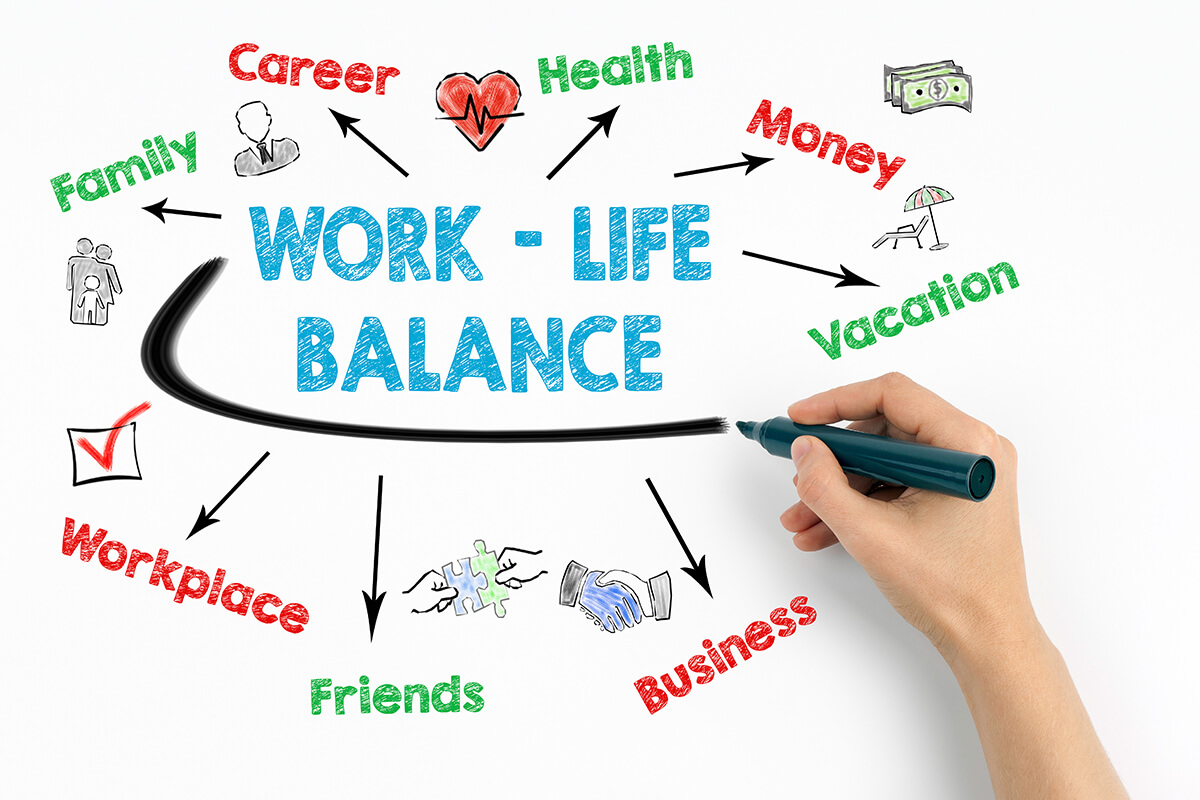Achieving a healthy work-life balance can be quite a challenge, and small business owners often struggle with finding and maintaining that balance more than others.
As the owner, you’re responsible for so many aspects of the organization. You may handle hiring and training, finances, marketing, tech support, and more. Even if your organization is well-established and fully staffed, you still may feel as if there are many tasks that will only be done correctly if done by you. This often leads to “overworking,” which is just another way of saying you may be doing too much.
Why Work-Life Balance Matters

Overworking over extended periods of time can be a gathering storm of problems on a number of levels. It can lead to damaged personal relationships, health issues, and an increased risk for burnout. With all the pressure you put on yourself to do it all to make your business a success, you may find yourself neglecting those things outside of work that matter too. Your days can quickly become all work and no play, when the whole point of starting a business was to enjoy your job and find satisfaction in your life.
When enjoyment and satisfaction are lost, it can leave you wondering why you ever thought owning your own business was a good idea. That lost joy affects your energy and motivation, and can even derail productivity. It also increases stress levels.
The stress associated with overworking has a clear impact on your health and has been linked to disorders such as diabetes, sleep disorders, excessive drinking, memory loss, depression, and heart disease. You may think the risk is just part of the price you have to pay as a business owner, but that is a myth. Working more hours doesn’t necessarily result in getting more done – or business success. Healthier work habits, enhanced productivity, and healthy work-life balance are the true keys to not only business success, but also satisfaction in life and the ability to enjoy the life you’re building.
What Healthy Work-Life Balance Looks Like
Healthy work-life balance is not a set formula or ratio of work time to personal time. Successful entrepreneurs are those who understand the need for some balance, but it’s important to understand that doesn’t mean that every day will involve an equal split between work time and personal life. Some days you may need to work late to meet deadlines. When a business is starting out, or going through a period of growth, you may need to put in extra time then too. Just be sure to counter that time with time off to spend with your family, friends, or other things you enjoy doing.

Also keep in mind that work-life balance can mean different things to different people, and that’s okay. Someone with a significant other, or those raising a family, may have different needs and priorities to consider than those who don’t have others in their lives who might be directly affected by the choices they make. The bottom line is that you should be taking the personal side of your life into consideration when you’re setting goals for your business and deciding what a healthy balance looks like for you.
All that said, there are strategies for proactively creating more balance in your life. Consider the following 10 steps for creating a healthy working lifestyle. You could choose to implement them all or just a few. Put the ones in place that will address areas of struggle for you.
Steps For Improving Work-Life Balance
1) Make Self-Care a Priority
Self-care shouldn’t be neglected, since how well you care for yourself physically and mentally actually gives you the energy to accomplish what you need to each day. Along that line of thinking, making time for regular doctor’s appointments is also important, and something busy business owners tend to skip or put low on the list of priorities. When your life seems overwhelmingly busy, it can seem impossible to make time for your overall health. But your health should be your number one priority.

Start by scheduling (and keeping) appointments for yearly physicals and times when you’re not feeling well, then look for ways to improve your lifestyle choices. Get enough sleep. Choose foods that fuel and nourish your body by choosing fresh fruits and vegetables rather than chips and cookies. Get a gym membership and use it, or invest in a fitness program you can do at home. Start meditating, praying, or setting aside some time daily for another activity that will help you stay calm, centered, and less-stressed. Developing a well-rounded routine for your physical and mental health will go a long way towards ensuring that you are capable of working for years to come.
2) Set Boundaries
Just as you set boundaries in other areas of your life, your job as a small business owner requires that you define boundaries and stick to them. For the most part, this pertains to the number of hours you work each week. Without boundaries, you could end up working constantly, checking emails in the middle of the night, skipping family events to tend to client needs, and pushing yourself beyond your physical limitations.
Establish the following boundaries to improve your work-life balance:
- Time: Set up specific hours for work and defined days off and adhere to that schedule. Keep vacation days and personal time sacred. This means that you should not even check your email before bed, or you will be tempted to respond to messages that seem important, but truly can wait until morning.
- Space: Create a separation between where you work and where you live. Even if your office is in your home, it’s important to establish a specific place that signifies work. When you leave that space, it’s time to stop working and begin attending to your personal life, your hobbies, and yourself.
- Accessibility: One of the biggest issues that small business owners face is how accessible they are to clients and employees. Technology makes it even harder to draw the line on when you are available. Set boundaries about when and how often you can be contacted and ensure that you only respond to true business emergencies.
3) Attend Social Events
Relationships are so important in life, but they are often pushed to the back burner when overworking becomes an issue. That is definitely one thing that’s easy to change. If you’ve planned an evening out with friends or a date night with your spouse, go. And go without your phone in hand. It’s important to keep social commitments not just physically, but be available emotionally as well. Listen, interact, and have fun. Work can always come later.
4) Take A Vacation
While it may be impossible to imagine your business running smoothly without you, it’s important that you make it possible. Personal vacation time is so important for everyone, including small business owners. Business owners just have to plan ahead. Whether it’s a three-day staycation or week-long skiing trip, just make sure you have a trusted someone you can turn the reins over to while you’re getting your much-deserved recharge. Enjoying a complete break from work will help you rest and rejuvenate. You will return to work with the excitement and ambition to handle even the most difficult project.

5) Examine and Adjust Your Habits to Make Work Time More Productive
Learning how to structure your time when you are working is so important. When you take the time to really look at how your time is being spent, you can often find ways to work smarter, rather than longer or harder, which maximizes your efforts for efficiency and better results.
How much of your time is spent on tasks that aren’t moving you toward your goals, yet you treat them as urgent? Understanding which tasks really matter in the bigger picture comes from planning, prioritizing, and focusing your time and energy on what really matters, which frees up time for other things – and reduces stress.

Also, studies show that the average workday for those in creative or intellectual fields should be only four hours. Our brains are only capable of maintaining concentration and focus for that period of time. Beyond that time, we can be responding to emails, handling administrative tasks, or catching up on industry news. So, structure your time in a strategic way that makes the most of maximum focus time and schedule other, less-taxing tasks that need to be done apart from that time.
6) Delegate
“Delegate” is not a dirty word, though many small business owners cringe at even the thought of delegating. It seems like delegating would actually create more work for them, or they fear the tasks wouldn’t be done right, but it’s impossible for one person to do everything. Effectively delegating is the answer. Hire the right talent and invest in proper training for each person on your team. Creating a reliable staff makes delegating easy, leaving you with time and energy to focus on the other important tasks that fall within your strengths.
7) Utilize Your Support System
Everyone has someone in their life who can offer support, even if they are simply available to listen when you need to talk something through. Build a support system that will be there when you need them to be, and remember to reciprocate the favor. Be someone else’s support when they need it, as well. Finding a mentor or hiring a business coach can also help you manage work-related issues and offer insights into financial issues, growth planning, or business procedures.
8) Block Out Time for Breaks and Healthy Work-Life Balance
Blocking time on your schedule to allow for breaks throughout the day is a great strategy for staying productive and avoiding burnout. It will help you work smarter, while also making time for your mental and physical health throughout the day too. Plan to focus and work for 90-minute blocks of time, followed by 10-15 minute breaks. During your breaks, go for a walk, pick up a coffee or snack, or chat with a friend about last night’s game. Taking your mind off work for a few minutes will help you feel refreshed when you return.
Time blocking is also great for making sure you have the balance in your schedule in terms of business vs personal. Include time for everything that applies – even rest or down time if that is an area that’s often neglected in your schedule. You should have colors for each activity that applies. For example, blue might be time with family and green might be time for friends. Yellow might be for work activities and purple could be down time, time for personal errands, or home projects. Orange could represent time for personal or professional development – like taking a class or learning a new skill. (Here’s a sample to show you what this might look like.)

When you use color-coding on your calendar, you’ll easily be able to see where your time is going and make sure you have the balance you’re striving for. It is a visual reminder of the healthy work-life balance goal you’ve set and helps you allot time for ALL the things that matter.
9) Say No
Your time and attention will be pulled in many directions when you’re a small business owner. While you may feel you should be able to do it all and have it all, it’s important to be realistic and simply say no when faced with a decision that will pull time and attention away from what matters in the bigger picture. Considering a new product or service that will require a lot from you but you’re already stretched to the limit? It’s okay to just say no, even if it’s just no for now. The same goes for decisions regarding what you should or shouldn’t commit to in your personal life. It’s all connected and there are only so many hours in each day. Take the time to really consider each decision that involves a new demand on your time, and say no when the time it will take doesn’t make sense right now.
10) Make Your Own Rules
This is your business and your life. Keep in mind why you started your company and don’t stray from the goals and objectives you originally laid out. Or, if those original goals and objectives no longer apply, you can make conscious choices to change them to fit with your current work-life balance needs. Don’t let your company overrun you or overwhelm you. Run it or it will run you!

There are things we don’t have control over, but we do have control over the choices we make regarding how our time and energy is spent. Take some time determine what your goals are, what healthy work-life balance looks like for you, and take control of your time, energy, and balance.
The Healthy Work-Life Balance Win
Work-life balance is so important – for all of us. Without it, we can easily push ourselves to the point of exhaustion, especially those of us who are inclined to overwork to begin with. Take the time to make a work schedule and ensure that you take the time off that you need for your mental and physical health. Hire a competent staff, so you feel comfortable and confident delegating tasks. And take your friends and family off the back burner and have some fun. Once you’ve developed a healthy work-life balance, you’ll be able to focus on your ultimate goals in life and business.
Chat with Cathy
Are you ready to bring more balance to your life, increase productivity and reduce stress? Schedule a complimentary session with Cathy today!


